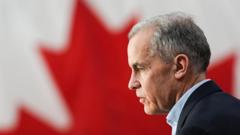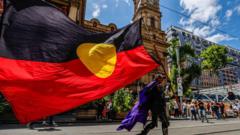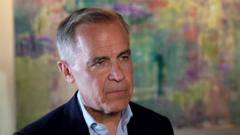In a heated political atmosphere, Senator Lidia Thorpe is under scrutiny after facing censure for her vocal dissent against King Charles during his recent visit, igniting debates on colonialism and sovereignty.
Controversial Censure of Aboriginal Senator Over King Charles Protest

Controversial Censure of Aboriginal Senator Over King Charles Protest
Australian Parliament reprimands Senator Lidia Thorpe following her assertive protest during royal visit.
Australian lawmakers have officially censured Senator Lidia Thorpe, an outspoken Aboriginal representative, for heckling King Charles during his visit to Canberra's Great Hall last month. Expressing her sentiments on the impact of British colonisation, Thorpe shouted statements such as "you are not my King" and "this is not your land" immediately after the King addressed the assembly. The censure motion passed with a 46-12 vote, condemning her behavior as "disrespectful and disruptive," indicating that such actions should disqualify her from being part of any parliamentary delegation.
Despite the disapproval from her fellow lawmakers, Thorpe stood her ground, claiming that poor travel arrangements had barred her from addressing the Parliament prior to the vote. “The British Crown committed heinous crimes against the first peoples of this country... I will not be silent,” she asserted to the media afterward. While her actions were criticized by several politicians and some Indigenous community leaders, they were also endorsed by a faction of activists who lauded her for drawing attention to the injustices facing Australia's first inhabitants—who continue to grapple with significant disparities in health, wealth, education, and overall life expectancy compared to their non-Indigenous counterparts.
Thorpe advocates for formal treaties between the Australian government and Indigenous peoples, arguing that, unlike in New Zealand and other former British territories, no such agreements exist in Australia. Many within the Aboriginal and Torres Strait Islander communities stress that they never relinquished their land or sovereignty to the Crown.
Meanwhile, King Charles received a warm welcome from Australian citizens during his five-day tour, accompanied by Queen Camilla. In his official address, Prime Minister Anthony Albanese remarked on the respect shown by Australians, referencing the ongoing discussions surrounding the country’s constitutional ties to the monarchy. Thorpe's activism is not new; during her 2022 swearing-in, she labeled Queen Elizabeth II as a colonizer, prompting her to retake the oath amidst controversy.
Australia has previously faced challenges in recognizing the rights of Indigenous Australians, notably with the recent rejection of a proposal aimed at granting constitutional recognition and establishing a representative body for Aboriginal and Torres Strait Islander issues. The referendum, known as the Voice, faced a contentious campaign, leaving an aura of uncertainty about future policy directions in relation to Indigenous rights in the nation. Among Aboriginal and Torres Strait Islander voters, sentiment towards the proposal was divided, despite a majority showing support. Notably, Thorpe aligned herself with the ‘No’ campaign, deeming the measure as insufficient and tokenistic.





















